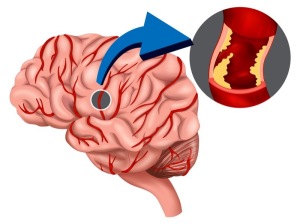Hardening of the arteries in the brain vessels leads to multiple smaller infarcts that in turn can cause mental impairment from vascular dementia.
Usually this happens more often in males, after the age of 70. There often is a history of smoking, prior heart attack, high blood pressure or diabetes. This dementia develops stepwise getting worse after each mini-stroke. This link shows what diagnostic procedures (thanks to www.nhs.uk for this link) are available to work up a patient with vascular dementia.
The vascular dementia might start with tiredness and some confusion and then progress to different neurological signs depending on where the mini-stroke lesions are located. This can grow into a full fledged stroke with paralysis of one body half (=hemiplegia).
Initially insight and personality are better preserved than with Alzheimers disease, but in later stages the symptoms are indistinguishable from Alzheimers.
Sometimes with vascular dementia pathological laughing and crying develops and there might be signs of Parkinson disease like gait problems and muscle shaking. This is due to closing off of blood vessels to the basal ganglia (a condition called “pseudobulbar palsy”). Sometimes a CT or MRI scan helps to depict multi small brain infarcts, but often even these tests are normal.
References:
1. OL Lopez et al. Neurology 2000 Dec 55(12):1863-1869.
2. K Yasojima et al. Brain Res 2000 DEC 887(1):80-89.
3. A Kontush et al. FreeRadicBiol Med2001Jan30(1): 119-128.
4. H Vanderstichele et al. Amyloid 2000Dec7(4):245-258.
5. Neely et al. Lipids 2000 Nov35(11):1249-1257.
6. RA Yokel Neurotoxicology 2000 Oct21(5):813-828.
7. Petanceska et al. Exp Gerontol 2000 Dec 35 (9-10):1317-1325.
8. MB Liddell et al. Brit J Psychiatry 2001 Jan 178: 7-11.
9. Sramek et al.ExpertOpinInvestigDrugs2000Apr9(4):899-915.
10.K Kosaka et al. Neuropathology 2000 March 20(1): 1-7.
11.V Haroutunian et al.Arch Neurol 2000 Aug57(8):1145-1150.
12. C Puckett et al. Am J Hum Genet 1991Aug49(2):320-329.
13. M Haltia Ann Med 2000 Oct 32(7): 439-500.
14. Ferri: Ferri’s Clinical Advisor: Instant Diagnosis and Treatment, 2004 ed., Copyright © 2004 Mosby, Inc.
15. Rakel: Conn’s Current Therapy 2004, 56th ed., Copyright © 2004 Elsevier







